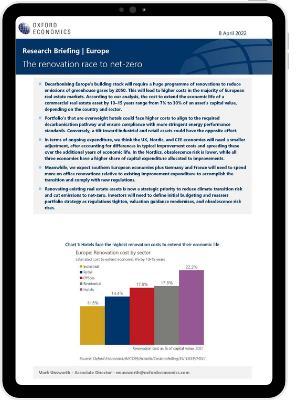Europe’s renovation race to net-zero
Decarbonising Europe’s building stock will require a huge programme of renovations to reduce emissions of greenhouse gases by 2050. This will lead to higher costs in the majority of European real estate markets. According to our analysis, the cost to extend the economic life of a commercial real estate asset by 10–15 years range from 7% to 30% of an asset’s capital value, depending on the country and sector.
What you will learn:
- Renovating existing real estate assets is now a strategic priority to reduce climate transition risk and cut emissions to net-zero. Investors will need to define initial budgeting and reassess portfolio strategy as regulations tighten, valuation guidance modernises, and obsolescence risk rises.
- Portfolio’s that are overweight hotels could face higher costs to align to the required decarbonisation pathway and ensure compliance with more stringent energy performance standards.
- In terms of ongoing expenditure, we think the UK, Nordic, and CEE economies will need a smaller adjustment, after accounting for differences in typical improvement costs and spreading these over the additional years of economic life.
- We expect southern European economies plus Germany and France will need to spend more on office renovations relative to existing improvement expenditure to accomplish the transition and comply with new regulations.

Related Posts

Post
Office rents entering growth cycle in Australia
CBD office markets in Australia face high vacancy rates, but a supply shortage is expected to drive a strong rent recovery. Effective rents are forecast to rise sharply up to 108% in some cities by FY2035 as vacancy rates fall and incentives normalise.
Find Out More
Post
Housing policy outlook clears after Federal Election in Australia
Saturday's Federal Election decisively delivered a second term for the Albanese government, clearing up the policy outlook.
Find Out More